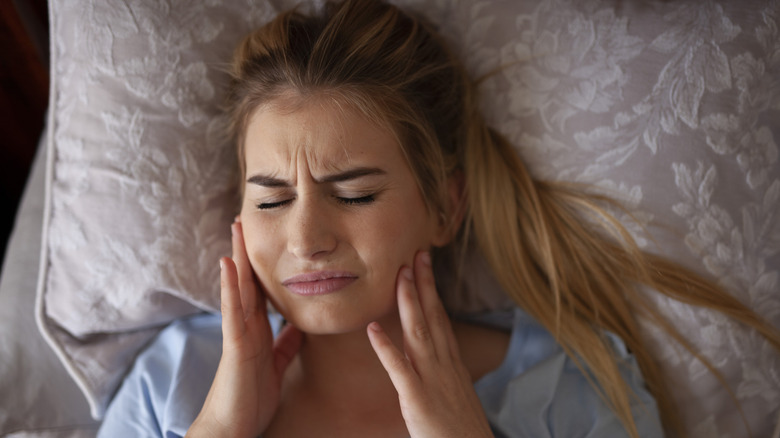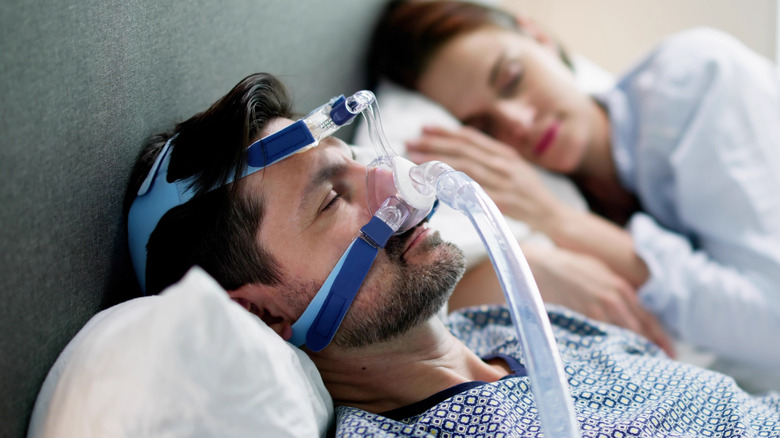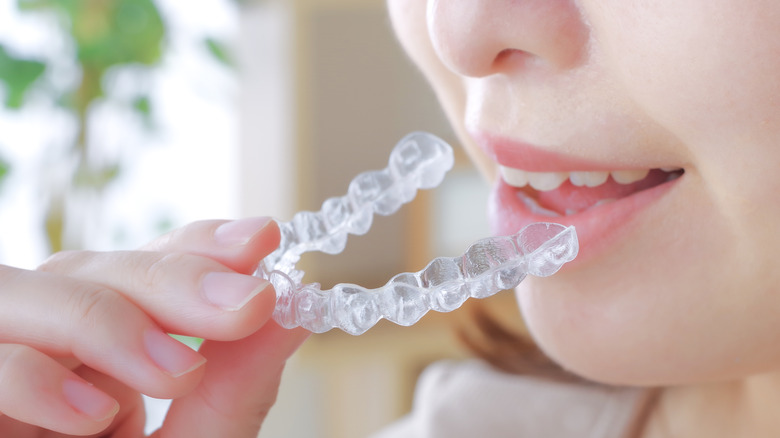If You Grind Your Teeth While You Sleep, You Might Have This Medical Condition
According to the Mayo Clinic, teeth grinding, also known as "bruxism," is a condition in which you unconsciously clench or grind your teeth. It can occur while you're awake (awake bruxism) or while you are asleep (sleep bruxism), and often goes unnoticed until symptoms like jaw pain, headaches, or worn-down teeth appear. In order to prevent these issues, it's essential to understand why teeth grinding occurs so it can be treated before these symptoms worsen.
While the exact cause isn't always clear, the Mayo Clinic says that teeth grinding can be linked to a combination of physical, psychological, and genetic factors. Stress, anxiety, anger, or frustration can trigger the condition, especially during sleep. Lifestyle habits such as smoking, excessive caffeine or alcohol use, and certain medications — especially antidepressants — may increase the risk.
One cause of teeth grinding you might not expect, however, is sleep apnea. Sleep apnea is a disorder in which people may temporarily stop breathing during sleep when their throat muscles relax and block or narrow their airway (per Sleep Apnea Solutions).
How sleep apnea and teeth grinding might be linked
A 2019 study in the Journal of Clinical Medicine found that out of 110 adults who were tested in a sleep lab, 86.37% had obstructive sleep apnea and 50% had teeth grinding. The authors also noted that teeth grinding was more common in individuals with mild to moderate sleep apnea than in those with severe sleep apnea. They additionally found that men, those who had diabetes, and those who had more breathing disruptions were more likely to grind their teeth.
Dr. Raj Dasgupta, who is a sleep specialist and pulmonologist as well as an associate professor of clinical medicine at the University of Southern California's Keck School of Medicine, told CNN Health: "There's a theory on why [sleep apnea causes teeth clenching] — the airway becomes obstructed, so the muscles in the mouth and jaw move to try to free the blocked airway." Dasgupta added, however, that this theory has not been proven.
How sleep apnea and teeth grinding are treated
SleepApnea.org explains that treatments for sleep apnea and sleep bruxism often overlap due to how frequently they occur together. Managing sleep apnea may reduce your episodes of nighttime grinding by addressing the underlying cause of your disrupted sleep, according to this organization.
PAP therapy — such as CPAP or BiPAP machines — is a common and effective treatment for sleep apnea. These devices deliver pressurized air to keep the airway open during sleep, reducing the number of arousals that can trigger teeth grinding. Many patients find that teeth grinding improves once their sleep apnea is under control.
Oral devices may also help. Bite splints can protect teeth from grinding damage, though they're not recommended for sleep apnea patients unless custom-fitted by a sleep-trained dental professional. Mandibular advancement devices, which reposition the jaw to improve airflow, can reduce sleep apnea symptoms and prevent teeth grinding during sleep.
Other strategies include reviewing medications that may trigger bruxism — like certain antidepressants — and improving sleep hygiene. Limiting caffeine and alcohol before bed and practicing relaxation techniques like deep breathing may help reduce nighttime muscle activity.
Together, these treatments aim to improve sleep quality, protect teeth, and reduce symptoms of both conditions.


